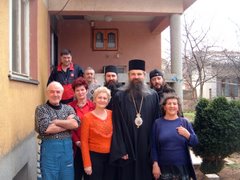Únited States and European Union Already Dividing the Spoils Before Serbian Election
KiM Info Newsletter 19-01-07
Ahtisaari's Kosovo Status Recommendation Seen To Cause EU Splits
BRUSSELS (AP) January 18
European Union officials and diplomats in Belgium expect U.N. mediator Martti Ahtisaari to recommend limited independence for Serbia's breakaway province of Kosovo when he submits his proposal on the future of the region that has been a U.N. protectorate since 1999.
The ruling, which must ultimately be approved by the U.N. Security Council, is likely to result in a diplomatic clash between Russia - which strongly backs Belgrade's claims that Kosovo should remain part of Serbia - and Washington, which has backed independence for the territory.
It could also result in a tug-of-war within the E.U. between countries that oppose any secession - including Spain, Greece, Cyprus, Romania and Slovakia - and those that have backed it, such as the U.K., the Netherlands and others.
Whatever happens, the E.U. itself plans to keep a mission in Kosovo to oversee the implementation of the accord. According to an E.U. report made available to The AP Thursday, its top envoy in Kosovo likely will have veto power over laws and government decisions, and the authority to sack officials "acting in a manner designed to prevent implementation of the settlement."
And in an apparent concession to Serbia, the E.U. document also says that the Serb minority in Kosovo will retain direct links with Belgrade, whether it gains some form of independence or remains a self-governing part of Serbia.
Although details of Ahtisaari's package - which is expected to be unveiled soon after Serbian elections on Sunday - remain a closely guarded secret, diplomats in Brussels say they have received some indication of what it will contain. The officials said they expect Ahtisaari to recommend "conditional and controlled independence" for Kosovo. During the period of "provisional independence," which would be supervised by the E.U. and other international bodies, Kosovo's government would be expected to meet a series of benchmarks. These will include respect for human rights and reaching an agreement with the Serbian minority about its future status. A fixed timetable for the authorities to achieve these goals isn't likely, officials said, adding Kosovo wouldn't move forward to full independence until all the set conditions are met.
A Western diplomat based in Brussels predicted that within the framework of limited sovereignty, Kosovo wouldn't become a fully independent nation for some time yet although it would effectively be free of Serbia. As such, it wouldn't be granted U.N. membership, nor have its own armed forces. Belgrade has insisted that Kosovo - which has been administered by the U.N. since a brief war in 1999 - must remain part of Serbia, albeit with a wide-ranging autonomy. But ethnic Albanian politicians in the provincial capital of Pristina say nothing short of outright independence will be acceptable.
The highly charged issue has serious international implications because Kosovo has been part of Serbia since medieval times, and any U.N.-approved move to grant it independence or greater autonomy will inevitably be regarded as a precedent in other independence-minded provinces elsewhere in the world.
EU To Have Veto Over Kosovo Albanian Parliament
BRUSSELS (AP) 18 January
A European Union representative in Kosovo would likely have veto power over government decisions and the authority to sack officials, hampering the accord on the future status of Serbia's breakaway province, according to an E.U. report made available to The Associated Press Thursday.
The document - a report to the European Commission - outlines the role the European Union will play in the province once Kosovo's future status is resolved. The E.U. mission will replace the U.N. administration that is currently running Kosovo.
An E.U. representative appointed to the provincial capital, Pristina, will have "the authority to make certain defined appointments in the economic sphere, to annul decisions taken and laws passed by governmental bodies or by assemblies (at central and local level) which are at odds with the letter or spirit of the settlement," the report said.
"It is likely that he/she would also be mandated to remove individuals whom he/she judges to be acting in a manner designed to prevent implementation of the settlement," it said.
The system would be similar to that implemented in Bosnia after the war ended there in the 1995. There, a U.N. representative had final say in administrative issues, and had the power to block laws or fire ministers.
Martti Ahtisaari, the U.N. envoy mediating talks to determine Kosovo's status, is expected to recommend limited independence for the province when he submits his proposal on the future of the region that has been a U.N. protectorate since 1999.
Belgrade insists that Kosovo must remain a self-governing part of Serbia. But ethnic Albanians have warned they won't accept anything less than full independence.

















